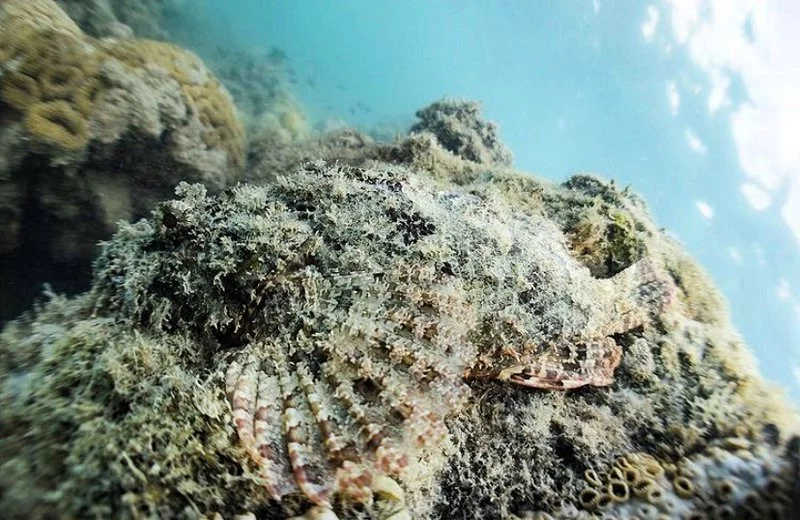The name scorpion fish is perhaps the biggest indicator of what these fish are best known for, their sting. Scorpion fish are in the genus Scorpaena which is part of a family of fishes called Scorpaenidae which includes other highly venomous fish such as lionfish and stonefish. The sting of these fish is delivered through large spines in their dorsal fin, these spines can be laid flat and when the fish feels threatened they will flare them up ready to strike. These spines can cause deep wounds and also inject venom into the unlucky victim. This venom can be extremely painful and cause a host of different symptoms and in some cases can be fatal. Most stings from scorpion fish are the result of humans being unaware of their presence on the seafloor. These fish prefer to live among rocks and coral or the bottom and are very well camouflaged. This is great for hiding from predators but not so great for the unsuspecting human who accidentally steps on or touches one. As the waters of Australia are home too many fish in this venomous family, antivenins are readily available.
Both tropical and temperate waters around the world are home to scorpion fish. They can be found in shallow marine estuarine and even in fresh waters however some species have been discovered at depths of over 2000 meters. Their preferred habitat is coral and rocky reefs. These habitats provide the fish with the perfect place to blend in and hide from predators and also to sit and wait for unsuspecting prey.
The reason that they can hide so well is their cryptic appearance. Their colouring can range from muted mottled browns to reds and orange and they have skin flaps and feathery fins which help to distort the shape of the fish. This makes them almost impossible to spot when among the coral and rocks. Another feature some of these fish have to aid in their camouflage is that they will allow algae and even sponges to grow over their skin, further giving them the appearance of a rock. They also have the ability to sit incredible still as they do not need to be moving constantly for water to pass over their gills. Scorpion fish can also vary quite a bit in size depending on species. Some will grow quite large and reach over 40 centimetres in length while others will only grow to a maximum of 20 centimetres.

Scorpion fish are ambush predators, they rely on their exceptional camouflage and ability to be as still as a rock to be completely invisible to their unsuspecting prey. They will sit motionless on the seafloor waiting for their prey to swim above them. Once the prey animal is close enough the scorpion fish will open their large mouth and effectively suck the animal in, this all happens at such a high speed that if you blink you will miss it. They will feed mainly on other small fish and invertebrates.
They are not particularly social animals and will send most of their life in solitude only coming together to breed. When breeding the fertilisation of the eggs is external. The female will release more than 15,000 eggs into the water and the males will release their sperm at the same time. The eggs will become fertilised in the water column and then float to the surface where they will be safer from fish egg loving predators. The incubation period is quite short and after two days the eggs will hatch, the baby scorpion fish will remain as zooplankton at the surface until they are developed enough to make their way down to the reef and start their life as a mature fish.
Australia is home to 12 different species of scorpion fish in both our warm tropical waters in the north to the cooler temperate waters in the south. The sheltered fringing reefs of the Whitsundays are the perfect environment for these venomous fish. There is plenty of coral and rocky substrate for them to hide in and a smorgasbord of tasty critters for them to prey on. They can be spotted on snorkels around the islands if you look closely at the reef. Although they have a formidable reputation because of their potent venom they are not aggressive fish so if you give them the respect and space they deserve both you and they fish can come away from an encounter unharmed and happy.



